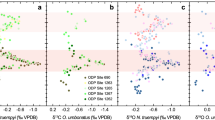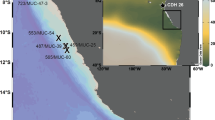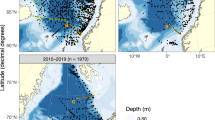Abstract
DURING the past few years, a method has been developed for determining palæotemperatures by measuring the ratio of oxygen-18 to oxygen-16 in the calcium carbonate of fossil shells1,2.
This is a preview of subscription content, access via your institution
Access options
Subscribe to this journal
Receive 51 print issues and online access
$199.00 per year
only $3.90 per issue
Buy this article
- Purchase on Springer Link
- Instant access to full article PDF
Prices may be subject to local taxes which are calculated during checkout
Similar content being viewed by others
References
Epstein, S., Buchsbaum, R., Lowenstam, H. A., and Urey, H. C., Bull. Geol. Soc. Amer., 62, 417 (1951).
Urey, H. C., Lowenstam, H. A., Epstein, S., and McKinney, H. C., Bull. Geol. Soc. Amer., 62, 399 (1951).
Epstein, S., and Mayeda, T., Geochimica et Cosmochimica Acta (in the press).
Brooks, C. E. P., “Climate through the Ages” (1949).
Arrhenius, G., “Sediment Cores from the East Pacific” (in Pettersson, H., “Reports of the Swedish Deep-Sea Expedition”, 5, fasc. 1, 1952).
Emiliani, C., and Epstein, S., J. Geol., 61, 171 (1953).
Author information
Authors and Affiliations
Rights and permissions
About this article
Cite this article
EMILIANI, C., EDWARDS, G. Tertiary Ocean Bottom Temperatures. Nature 171, 887–888 (1953). https://doi.org/10.1038/171887c0
Issue Date:
DOI: https://doi.org/10.1038/171887c0
This article is cited by
-
Peculiarities of the geographical and vertical distribution of marine isopods and the problem of deep-sea fauna origin
Marine Biology (1973)
-
Zur Bildung des Roten Tones
Archiv für Meteorologie, Geophysik und Bioklimatologie Serie A (1954)
Comments
By submitting a comment you agree to abide by our Terms and Community Guidelines. If you find something abusive or that does not comply with our terms or guidelines please flag it as inappropriate.



